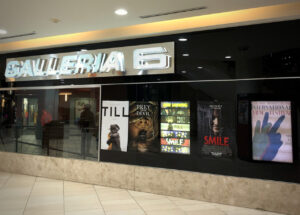
Photo by John Griswold
The same month I started writing here, four years ago, an old friend moved his art business to Los Angeles so he could get more “theatrical” (narrative film) and commercial work as an actor, which is his second job and main ambition. He calculated it would take him seven years to get significant work in the LA market, but he has beaten that deadline many times over. Most recently, an independent feature and a short he had roles in premiered at Sundance and won at Tribeca.
I have been following his acting career for ten years. I saw him twice on stages in Chicago, and many times, on laptop and phone screens, in clips from finished productions, or in multiple takes for auditions. Yesterday was the first time I have seen him on the big screen, and I had to stop myself from telling the box-office person and film festival volunteers that I knew someone acting in the film I was about to see.
The 31st Annual Whitaker St. Louis International Film Festival (SLIFF) has just wrapped 10 days of screenings of some 250 independent feature-length and short films, at venues all over the metropolitan area and online. Nearly 19,000 viewers saw films from 42 countries, in 35 languages.
“SLIFF is an Academy-sanctioned qualifying festival,” the website for Cinema St. Louis, SLIFF’s parent organization, says. “Winners of the juried award [in certain categories] can submit to the Academy of Motion Picture Arts and Sciences for Oscar® consideration.” That is a big deal in the indie world.
The film I went to see, Cherry (not to be confused with the 2021 film starring Tom Holland), was directed by Sophie Galibert. It won the Audience Award at Tribeca this year, and was a nominee for best feature in the Calgary and Warsaw International Film Festivals. The film’s title character is a young woman who faces an unplanned pregnancy and the choice to abort it or not.
Cherry (Alexandria Trewhitt) is what might have been called a free spirit in older times, which is to say she is a sort of flower child who is sweet but cannot hold a job, not even at the magic shop, where she ties balloons, or with a roller-skating team that performs at bar mitzvahs and has gotten the shocking windfall of a “national tour” contract. Her boyfriend is still a mid-20s kid like her, with dreams of riches with his band. Her family’s loving in its way but a mess, except for her semi-estranged dad, Bob, played by my friend, who is responsible, kind, yet beaten by life. Due to her own sense of shame that keeps her from telling the family whose support she craves, and her boyfriend’s anger, she is left to make the decision completely on her own. That would-be anguish is the drama of the film.
“It’ll make me an adult, right?” she says.
An astute media critic once told me that The Office (the American series) is a lie, because while it does something more ambitious with its comedy than the average sitcom, it still shills for happy endings by ignoring real-world consequences. The same might be said for Cherry. At almost every new scene I expected reality to sink its crushing teeth into the young woman, who seems to specialize in self-sabotage, but there is almost none of that, and she emerges, smiling, lovely, wearing a flower crown, as happens in movies on Lifetime.
But there is good acting in this film that gestures toward the hardness of art, especially by my friend. We are close but see each other about once a decade on average, and it was nearly shocking to see him on the big screen, the audience silhouetted by the light he and the lead actor threw off. He had warned me he was at his heaviest for the role, and he looked, with his swollen hands and bent nose, like a former fighter working a security job that just allows him to make it and not much more. There was no hint in the movie or from him that “fighter” was part of Bob’s background, except in the sense of his character being the film’s nod to all in the world that Cherry willfully ignores and evades, and that was something true.
